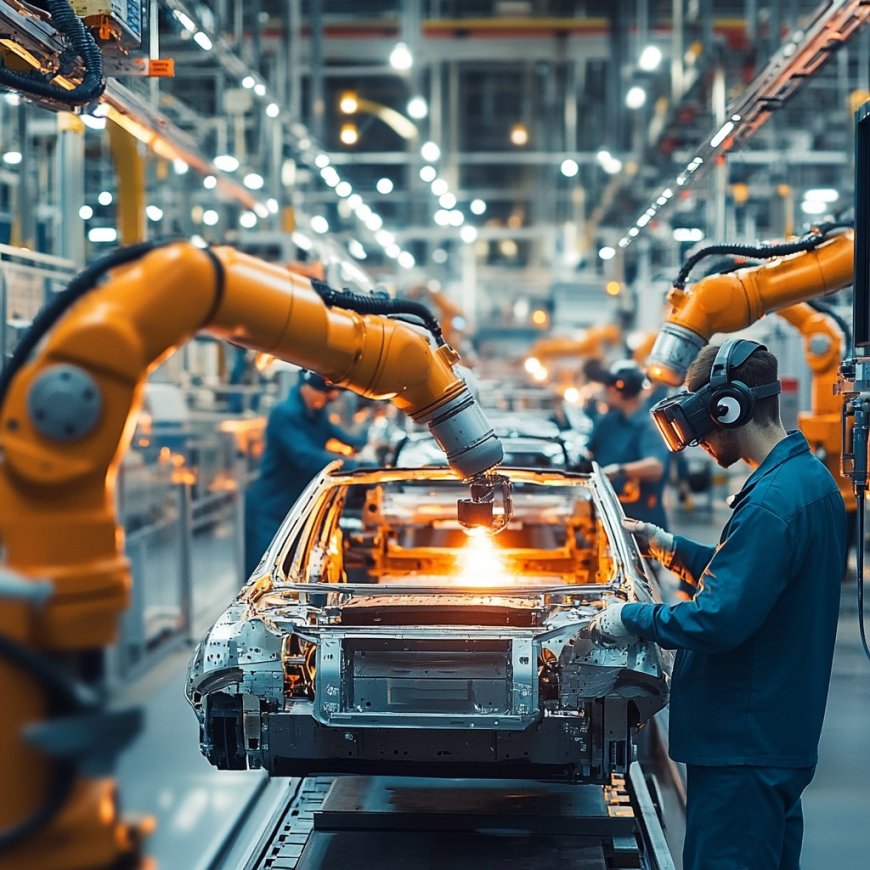The Impact of Automation on the Job Market: Opportunities and Challenges
Hello! Now let's go over one of the hot topics causing a stir in the workplace these days: how automation is affecting jobs. The more technology improves—and it does so at a rate faster than one can say the words "robot takeover"—the more urgent it becomes to see just what this shift is doing to change the way we work, the skills we need, and the future of work.

The Impact of Automation on the Job Market: Opportunities and Challenges
The Impact of Automation on the Job Market ! Hello! Now let's go over one of the hot topics causing a stir in the workplace these days: how automation is affecting jobs.
The Impact of Automation on the Job Market
The Impact of Automation on the Job Market! The more technology improves—and it does so at a rate faster than one can say the words "robot takeover"—the more urgent it becomes to see just what this shift is doing to change the way we work, the skills we need, and the future of work. Pour yourselves a cup of coffee and let's delve into the opportunities and challenges automation presents!
What Is Automation?
The Impact of Automation on the Job Market ! First, let's define what we here mean by automation. Simply explained, automation means the use of technologies for performing tasks that otherwise require human effort. It might be simple, like filling out forms, to highly complex, such as moving vehicles or supply chain management. The Impact of Automation on the Job Market ! Where AI is getting more intelligent, so is automation; it's getting increasingly complex and is impacting some fields in ways we had never thought possible.
Opportunities Created by Automation
Increased Productivity
The Impact of Automation on the Job Market ! The great benefit of automation is that efficiency has increased. Machines can work a lot faster and more accurately than human beings, which implies higher levels of productivity. For businesses, this means the ability to produce more in less time, often translating into higher profits. This could also mean, for employees, less drudgery and more freedom to focus on creative and strategic work.
New Job Openings
Even as all these jobs may be lost, it is important to note that automation is also creating them. The Impact of Automation on the Job Market. For each function taken over by a machine, new roles seem to spring up that need human oversight, innovation, and emotional intelligence. A case in point today: we need data analysts to interpret the information automated systems generate, and technology support professionals to manage those technologies.
Skill Building
Where automation takes over a lot of job tasks in the workplace, this replacement at the same time asks for a change in skill sets. Employees are encouraged to update their abilities and acquire new ones for survival in the job market. This will generate lifelong learning and probably result in more job satisfaction since people will be searching more for jobs that match their interests and strong points. Companies are increasingly investing in diverse trainings for employees to help them adapt to the various new technologies coming out; this continues to benefit all stakeholders involved.
Challenges of Automation
Job Displacement
Let's face it: job displacement is a legitimate cause for concern. The Impact of Automation on the Job Market. The more machines are able to perform the tasks of everyday life, the more likely it is that many workers will be out of a job. Naturally, this applies only to jobs with repetitive tasks, such as work on an assembly line or basic data entry. Ensuring that these workers, whose jobs may have become redundant due to the introduction of machines, will not suffer severely economic hardship is the real challenge.
Skill Gap
The Impact of Automation on the Job Market. Automation does create a number of jobs, but simultaneously, it accentuates the growing skills gap. Many workers may not have the required set of skills to fill the newly created positions provided by automation. Unless such a gap is addressed, it may result in higher unemployment and further economic disparity. It is important that, through cooperation between academic institutions, corporations, and the government, training programs will be designed and instituted that prepare the workforce with the required competence for the future.
Financial Disparity
This increase in automation may further skew economic disparities. Those individuals who have more education and higher-order skills are bound to be helped by automation. In contrast, those individuals with low-order skills may find fewer jobs. The widening gap between classes exacerbates social unrest and a decrease in the lowest-tier members' opportunities. Such a challenge will call for contributions and participation at all levels of society.
The Future of Work
So, what does the future hold? The job scenario is surely going to change with more development in automation and AI. Still, one should not forget that the change is not essentially bad. By embracing automation, we will have a much more efficient and innovative work force. The most essential step is to adapt and prepare ourselves for the upcoming challenges.
Changing with the Times
To thrive in the new setting, people and organizations must be receptive to change. This will involve being open to learning new skills, exploring new roles, and leveraging technology to enhance productivity. Companies should encourage a culture of continuous learning, encouraging employees to develop the skills they need to flourish in an automated economy.
Collaboration is Key
Addressing automation-related challenges requires collaboration across industries. It requires a synergy from employers, educational institutions, and government agencies in training program design that would equip employees with the needed skills in the future workforce. The more we invest in education and training, the more flexible the workforce will be in handling the changes brought about by automation.
Final Words
Automation, in other words, has a double-edged sword effect on job opportunities. While it brings some challenges in the form of job displacement or skill obsolescence, it also offers opportunities in terms of increased productivity, job creation, and the acquisition of new skills. Embracing change, prioritizing education, and working collaboratively are sure ways to make life promising for all employees in this ever-changing environment.
What do you think of automation? Are you excited or somewhat appalled by changes that may take place in the future? We welcome your thoughts on it. Please continue the discussion in the comments section below!
What's Your Reaction?




































